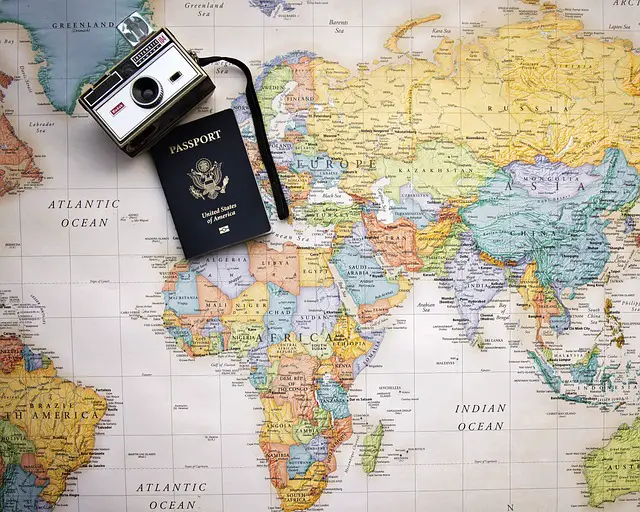Tourism involves travel for leisure or business purposes, hospitality focuses on providing services to travelers. Tourism is a significant contributor to the world’s economy as it creates jobs and generates revenue. On the other hand, hospitality is all about providing exquisite customer service experience that keeps guests coming back for more.
What is tourism?
(Image by Simon Berger from Pixabay )

Tourism is the act of traveling for pleasure or business purposes. It involves visiting different places, experiencing new cultures and trying out unique activities. The tourism industry includes a wide range of businesses such as hotels, restaurants, transportation companies and travel agencies.
Tourism can take many forms – from domestic trips to international vacations. Some people prefer adventure tourism which may include activities like hiking, bungee jumping or skydiving while others opt for cultural tourism where they explore historical sites and immerse themselves in local traditions.
One interesting aspect of tourism is that it has both positive and negative impacts on destinations. On one hand, it can provide economic benefits by creating jobs, generating revenue and boosting local businesses. On the other hand, over-tourism can lead to environmental degradation, overcrowding and strain on resources.
Though, tourism plays an important role in promoting global understanding and appreciation for different cultures across the world.
What is hospitality?
(Photo by Scott Evans on Unsplash )

Hospitality is often defined as the act of welcoming and hosting guests in a friendly, helpful, and generous manner. It encompasses everything from providing comfortable accommodations to offering excellent customer service at restaurants or hotels.
The hospitality industry can be found all around us – from luxury resorts to fast food chains. It involves various sectors such as lodging, food and beverage services, event planning etc.
At its core, hospitality is about creating positive experiences for guests or customers by anticipating their needs and going above and beyond to meet them. This may involve anything from providing personalized recommendations based on their interests to ensuring that they feel valued throughout their stay.
In addition to making guests feel welcome, hospitality also involves maintaining high standards for cleanliness, safety and comfort in order to create a pleasant atmosphere for everyone involved.
The success of any business within the hospitality industry relies heavily on its ability to provide exceptional service with a personal touch that leaves a lasting impression on its customers.
Tourism Vs. Hospitality – Key differences
Tourism and hospitality are two related yet distinct concepts. While tourism refers to the activities that involve people travelling from one place to another for leisure, business or other purposes, hospitality is all about offering friendly reception and entertainment to guests. Though both tourism and hospitality share some similarities in terms of providing customer service, there are key differences between them.
One of the main differences between tourism and hospitality lies in their core objectives. Tourism focuses on promoting destinations, attractions, events or experiences while Hospitality emphasizes delivering excellent guest services such as accommodation, food & beverage services etc.
Another distinction between these two industries is their target market. Tourism mainly targets travellers who visit a particular location for various reasons like sightseeing or adventure sports; whereas Hospitality caters primarily to those tourists by accommodating them with comfortable living arrangements during their stay.
Tourism also has a broader scope than Hospitality since it encompasses many different sectors such as transportation companies (airlines), tour operators/guides, travel agencies etc., while Hospitality only deals with accommodations (hotels/motels) and food & beverage establishments (restaurants/bars).
Understanding the difference between these two industries will help you identify which sector interests you more when considering a career path within either field. Whether it’s working behind-the-scenes as an event planner in tourism or serving customers directly at a five-star hotel restaurant – each industry offers unique opportunities for growth and success depending on your interests!
The importance of tourism and hospitality
Tourism and hospitality play a crucial role in the growth of any economy. They are interdependent industries that complement each other to create an overall positive impact. Tourism helps generate revenue for local economies by attracting visitors from different parts of the world, while hospitality ensures their comfort and satisfaction during their stay.
The tourism industry creates job opportunities in various sectors such as transportation, accommodation, food and beverage services, entertainment and recreation. These jobs not only help reduce unemployment but also provide training programs for employees to enhance their skills.
Hospitality is essential because it sets the tone for a visitor’s experience. A hospitable environment can attract repeat visitors and positive reviews which can boost tourism numbers in the long run. The quality of service provided by hotels, restaurants or tourist attractions greatly influences a customer’s decision on whether to return or recommend it to others.
Tourism also provides an opportunity for cultural exchange between locals and tourists from different backgrounds that promotes mutual respect and understanding. This exchange leads to an increased appreciation of diverse cultures around the world.
Both industries drive economic growth through taxes imposed on accommodation services, sales taxes on goods purchased by tourists, travel insurance premiums among others providing funding towards local infrastructure development projects.
The importance of tourism cannot be overemphasized since its contribution transcends beyond generating income but fosters socio-economic development globally whilst ensuring people have memorable experiences at destinations they visit thanks to excellent hospitality practices upheld within these areas.
What is the highest paying job in tourism?
One example of highly paid jobs in tourism is travel managers or directors. These professionals are responsible for overseeing all aspects of travel programs within companies and organizations, including logistics, safety measures, and budgeting. They typically have extensive experience in the field and earn an average annual salary of around $85,000.
Another high-paying job is hotel general manager. This role involves overseeing all operations within a hotel and ensuring guest satisfaction while maximizing profitability for owners or shareholders. General managers usually have several years of experience working their way up from entry-level positions to senior management roles and earn an average annual salary of approximately $95,000.
Tourism also offers well-paid careers as event planners who coordinate conferences or events such as weddings, trade shows or corporate meetings with earning potential averaging around $60k annually depending on location.
The highest paying jobs require substantial expertise and experience; however, these roles provide great career advancement opportunities within the industry’s upper echelon while rewarding skilled professionals with excellent paychecks!
What is the F&B service?
The F&B (Food and Beverage) service is a crucial part of the hospitality industry. It encompasses all aspects of food and drink service, including preparation, presentation, and delivery. The goal of the F&B service is to provide guests with an exceptional culinary experience while meeting their unique needs.
One key aspect of the F&B service is menu design. This involves creating menus that appeal to different tastes, dietary restrictions, and cultural preferences. Once a menu has been created, it must be executed flawlessly by kitchen staff who prepare dishes according to specified recipes.
In addition to menu design and execution, the F&B service includes front-of-house operations such as table setting, serving guests promptly and courteously at tables or through room-service setups.
Beverage selection is another important factor in providing excellent F&B service. A well-curated wine list or cocktail program can enhance guest experiences by providing options that complement specific meals or personal preferences.
The Food & Beverage Service plays a vital role in enhancing guest satisfaction within any hospitality establishment whether it’s a hotel restaurant or independent café.
Examples of tourism and hospitality
Examples of tourism include visiting popular tourist destinations such as Paris, New York City, or Tokyo. These cities attract millions of visitors every year due to their iconic landmarks, museums, and cultural attractions.
On the other hand, hospitality encompasses a wide range of services such as hotels, resorts, cruise ships and restaurants. For instance, when you check into a hotel room for your vacation or dine at a restaurant with friends and family – you are experiencing hospitality.
One example of exceptional hospitality is the Ritz Carlton Hotel chain which has built its reputation on providing luxury accommodations and personalized service to guests all over the world. Another example is Disney World Resorts which offers an immersive experience for families with themed rooms and activities that cater to children’s imagination.
In terms of tourism and hospitality combined – theme parks like Universal Studios in Orlando or Disneyland in California are examples where both industries meet. Guests can enjoy thrilling rides while also experiencing excellent customer service from staff members who ensure they have a memorable visit.
There are countless examples across both industries that showcase the importance of tourism and hospitality in creating unforgettable experiences for tourists worldwide.
Featured Image By – Pam Patterson from Pixabay








